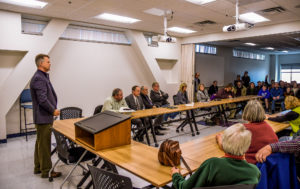

You’ve likely heard the phrase “All politics is local,” coined by former Speaker of the United States House of Representatives, Tip O’Neil. It is a phrase that is viewed as controversial for many reasons. Primarily because of the grammar usage pertaining to the verb “is,” rather than “are.” This four-word sentence seems to stump even those well-schooled in the nuances of subject-verb agreement, and naturally, many complex arguments about its correct usage have ensued.
The average person may not have an argument on hand regarding the correct way to use the verb “to be” in this situation, and they would be the majority. But perhaps they would argue, simply because of the way it sounds, that using “is” is the “less right” option. Yet, language – whether spoken slang or written Standard English – has always been an evolution and will continue to be so.
Perhaps the less obvious, yet arguably more controversial, part of that statement is the ideology itself. Is/are all politics local? And what does local even entail in certain geological contexts among differing demographics and types of communities?
In the United States, today’s presidential elections seem to focus on topics such as race, gender, abortion, immigration, same-sex marriage, or the role government plays in our lives. It is no secret that when a presidential candidate visits a state during campaign season, he or she tailors their speech to fit that area’s political landscape in order to achieve mass appeal.
More often than not, the issue that locals in rural areas espouse has to do with any promise of economic opportunity or growth, especially when it boasts revitalizing a fading, yet romanticized industry. Urban voters, on the other hand, tend to be more concerned with the reduction of crime, affordable housing, and quality of education. However different, the majority of rural and urban dwellers can agree that outsiders do not often understand the problems their communities face. And, unlike suburban dwellers, both rural and urban communities are more skeptical of outsider intentions.
In most industries, the answer to the question “is all politics local?” is both yes and no.
When they are local, they are very local and vary vastly from one community to the next. When attempting to build a relationship with a local community, it is important to consider all the messages that are being sent and whether those messages are appropriate for a specific audience in a specific area. After all, rural Ohio is very different from rural West Virginia. Similarly, a Ohio Republican/Democrat is not the same as a West Virginia Republican/Democrat, and so on.

In order to know if the message is right, a company must know more than just the political lay of the land. It has to also consider the local people’s cultural values, socioeconomics, and labor history. In light of those factors, how may an industry’s presence be interpreted alongside the differing narratives surrounding each local community in each state throughout a region?
In the Appalachian region for example, the natural gas industry is booming. This is a region that historically has been known for its upstream energy development, among other related midstream and downstream industries, and a place that takes much pride in the powering and building of the United States as we know it today. Accordingly, this is a region that has built much of its identity and cultural narrative around its energy-enmeshed labor history.
In some parts of West Virginia, particularly so in rural southern counties, there is an ever-present nostalgia surrounding coal. In Pennsylvania and in the urban metropolis of Pittsburgh, there is a strong history of steel. And, in Ohio, there are many once-flourishing suburban areas that remain as testament to the boom-bust nature of this industry. The closing or relocating of a local mill or factory left whole towns out of a job, waiting for the next opportunity to come knocking. Yet, these are the states that have been blessed with the most plentiful shale basins in the world.
Some industries have had a lesser hold than others in their decline among varying communities in these states. For example, the city of Pittsburgh is fully embracing a shift to advancements in technology, while surrounding counties are taking advantage of natural gas development. In West Virginia, where many politicians keep the promise of coal jobs at the top of their campaign pledge list, it is hard for the communities that have experienced the prosperity of that industry to envision their state supporting a competing energy industry, thus relinquishing its dependence on coal.
Each mindset differs, as they are shaped by different communities. The way a group of people feels about the bygone industries that shaped them in one part of a state does not necessarily apply to the way others in that same state may feel about transitioning away from it because they didn’t share the same experience of heavy reliance upon it. When it comes down to it, politics (views and expectations) will always change; sometimes drastically and depending on the state, but even more so on a local level.
For these reasons, it is important for any company to do background research on a community’s labor history, socioeconomics, and political partisanships before operations take place. On a state level, it is important to be familiar with the over-arching labor legacies for which people yearn and the potential for hyper-regulated policy in certain industries. At a local level, it is important to discern the community type –urban, suburban, or rural – to determine the level and strategy of communication and community outreach that will be needed.
In some instances, talk of jobs and statistics representing economic impact may be enough, while in other areas, sizeable philanthropic projects may be necessary. But always, local “politics” must be taken into account before any strategic communications and community outreach plans can be formed, let alone implemented, in order to foster lasting, flourishing relationships and business endeavors.






